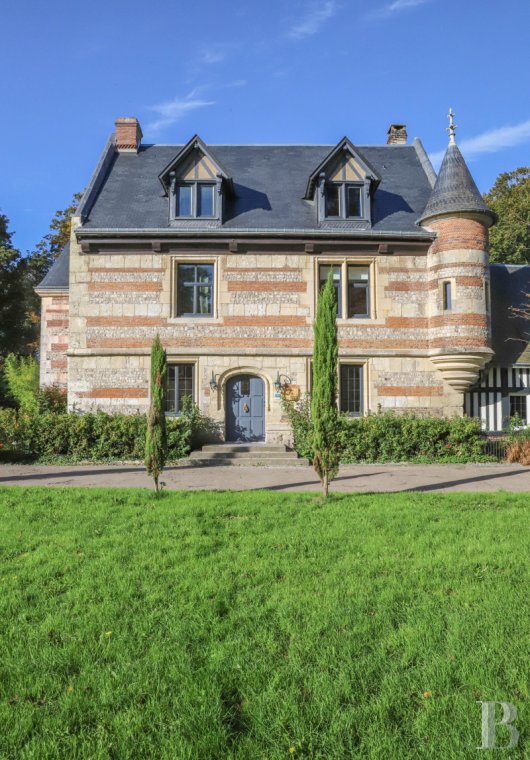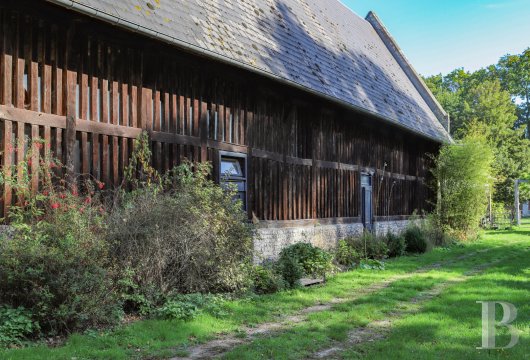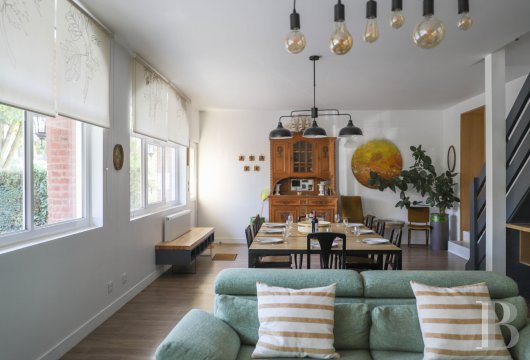Add to favorites
Log in to your personal space

There are works of art hidden around the park and the occasional exhibition is organised.
Guided tours with the owner of the premises are available on request.
The Château de Saint-Clair is a voyage in itself which begins on the way here, as guests travel to meet with family or friends. From the very first glance at the property, the journey continues across time and eras through the architecture and various constructions. Once inside, it concludes with an aesthetic wander to admire recent renovations and décor which connect the past with the comfort of the modern day through a myriad of colours and the utmost refinement. The park will also serve as a setting for leisurely daydreams invigorated by the sea air. Guests can indulge in these moments as they survey the nearby cliffs before contemplating the famous Aiguille hollow that was so dear to Maurice Leblanc. At the heart of one of the most renowned tourist sites, it is a real privilege to be able to benefit from such an intimate setting between sea and countryside!
For the proximity to the sea and the cliffs of Étretat. This is a very unique place that I am particularly fond of. I was also born in the Pays de Caux and have always wanted to make a name for myself in my home region. From knowing this area dotted with farmsteads, its culture and its traditions, it became necessary and obvious for me to buy a place here.

In the centre of the estate, a majestic dovecote immediately takes you back in time. Dating back to the 14th century, this Norman farmstead with a majestic main building, built with materials typical of the region (brick and flint), has continued to grow over the years. A watchtower adorns one of the facades. In the 18th century, the building was further extended by the addition of a farmhouse adorned with two turrets. In 1963, architect Roland Schweitzer rehabilitated the barn, which was also singular, by borrowing the Norman codes of half-timbering for its appearance and by creating more light with the addition of bay windows to make the building brighter. A rose garden, a small wood (recently planted with vines) a French-style vegetable garden, a landscaped park and a tennis court complete the ensemble.

The Château de Saint-Clair remained private until the beginning of the 20th century. During the Belle Époque, a period characterised by festivals and baths, the chateau became a character hotel and hosted large dinners in the park for city dwellers holidaying by the sea. The property served as a command post for the German army during the Second World War, before it was reborn a few years later and became a social centre for Jeunesse au Plein Air, a secular youth federation (officially recognised as a non-profit organisation since 1949) whose mission is to facilitate access to holidays and children's leisure. Several generations of children grew up here until the 1990s. Saint-Clair is therefore rich in its distant and near past, which quite naturally inspires us to perpetuate history by welcoming our guests in an open, refined and joyful place.
We work to offer our guests a large French holiday home. We invite them to travel and take the time to live by strolling, reading, writing, painting, or simply going for a walk. The park is an incentive to let go and find some peace of mind. The resident animals, the vineyards and crops, and the remarkable trees create a pleasant and relaxing setting. We bring teams together during seminars, and groups of families or friends for celebrations, golf, gastronomy and well-being weekends. An attentive and dynamic team offers a personalised welcome and takes care of all the needs of our guests, our number one priority. From the kitchen, we serve fresh, local products (sourced from our work with our neighbours in a local food network) accompanied by a fine wine list.

We know of some little corners of paradise very close to home. Although we must be careful to keep their names a secret for the benefit of our guests, we can certainly give some clues! With Étretat being a very busy seaside resort, we can point guests in the direction of some quieter gems along the Alabaster Coast. Some valleys and beaches, such as Vaucottes or Etigues, allow you to go for a nice walk, a picnic or a quiet swim in any season. Along the way, visitors will find marl quarries, cavities dug in the rock to explore. Michelin starred restaurants, such as Le Donjon, and traditional, regional restaurants such as Le Belvédère or Chez Nounoute can be found nearby. Fresh fish is sold at the nearby markets of Fécamp or Étretat which combine creative arts and gastronomy.

 A link to enter a new password has been sent to you by email.
A link to enter a new password has been sent to you by email.
By continuing your navigation, you accept the use of cookies to offer you services and offers adapted to your centers of interest and to measure the frequentation of our services. Learn more